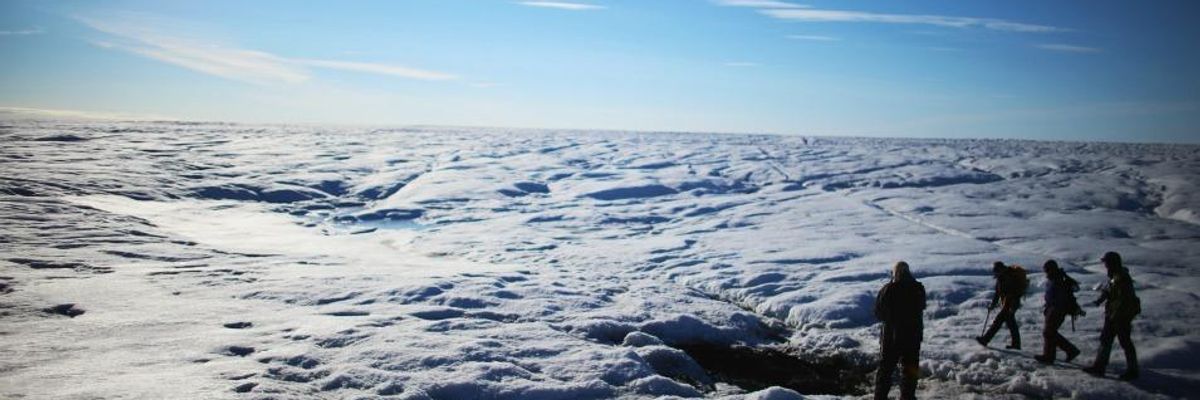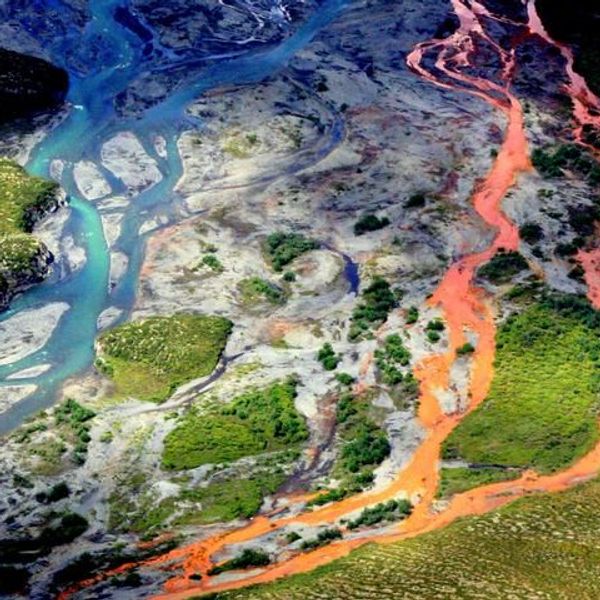
Scientists walk across Greenland's glacial ice sheet, examining the effects of climate crisis. This past winter has been the warmest the Arctic has ever seen. (Photo: Joe Raedle/Getty Images)
Researchers 'Staggered' by 'Crazy, Crazy' Record-Setting Warm Winter in Arctic
Arctic warming is just a symptom of "disease" that's getting worse, say climate scientists, as U.S. leaders refuse to curb human activities that contribute to climate crisis
This past winter has set a worrying record in the Arctic, as scientists examining the effects of climate crisis continue to express dismay at the region's warmest winter since researchers began documenting the climate there.
\u201cThe Arctic just had its warmest December on record and is currently experiencing a string of records for lowest Arctic sea ice. This is bad news for the US and the rest of the planet. What happens in the Arctic will not stay there. #GlobalWarming https://t.co/DR1u1z7TGb\u201d— NRDC \ud83c\udf0e\ud83c\udfe1 (@NRDC \ud83c\udf0e\ud83c\udfe1) 1520183524
At the northernmost tip of Greenland, researchers were "staggered" when they recorded more than 60 hours of above-freezing temperatures in February. Before last month, scientists had observed Arctic temperatures rising above freezing only in the month of February, both for brief periods--suggesting that the region is rapidly changing due to the warming of the Earth.
"It's just crazy, crazy stuff," Mark Serreze, director of the National Snow and Ice Data Center (NSIDC) in Boulder, Colorado, told the Associated Press. Serreze is known for his research on the decline of sea ice in the Arctic. "These heat waves--I've never seen anything like this."
"The extended warmth really has staggered all of us," Ruth Mottram, a climate scientist at the Danish Meteorological Institute, said.
In Barrow, Alaska, also known as Utqiagvik, February was 18 degrees warmer than normal while the whole season was about 14 degrees warmer, according to researchers.
Sea ice in the Arctic Circle also retreated to unprecedented low levels this winter, covering about 5.4 million square miles--62,000 fewer square miles than last year.
The reports of the record-setting Arctic winter come as the Environmental Protection Agency (EPA) shuts down parts of its website dedicated to climate science and rolls back regulations meant to limit greenhouse gas emissions.
"The underlying disease that's causing this [Arctic warming] is getting worse," Jennifer Francis said, a research professor at Rutgers University, said. "These are just the symptoms."
An Urgent Message From Our Co-Founder
Dear Common Dreams reader, The U.S. is on a fast track to authoritarianism like nothing I've ever seen. Meanwhile, corporate news outlets are utterly capitulating to Trump, twisting their coverage to avoid drawing his ire while lining up to stuff cash in his pockets. That's why I believe that Common Dreams is doing the best and most consequential reporting that we've ever done. Our small but mighty team is a progressive reporting powerhouse, covering the news every day that the corporate media never will. Our mission has always been simple: To inform. To inspire. And to ignite change for the common good. Now here's the key piece that I want all our readers to understand: None of this would be possible without your financial support. That's not just some fundraising cliche. It's the absolute and literal truth. We don't accept corporate advertising and never will. We don't have a paywall because we don't think people should be blocked from critical news based on their ability to pay. Everything we do is funded by the donations of readers like you. Will you donate now to help power the nonprofit, independent reporting of Common Dreams? Thank you for being a vital member of our community. Together, we can keep independent journalism alive when it’s needed most. - Craig Brown, Co-founder |
This past winter has set a worrying record in the Arctic, as scientists examining the effects of climate crisis continue to express dismay at the region's warmest winter since researchers began documenting the climate there.
\u201cThe Arctic just had its warmest December on record and is currently experiencing a string of records for lowest Arctic sea ice. This is bad news for the US and the rest of the planet. What happens in the Arctic will not stay there. #GlobalWarming https://t.co/DR1u1z7TGb\u201d— NRDC \ud83c\udf0e\ud83c\udfe1 (@NRDC \ud83c\udf0e\ud83c\udfe1) 1520183524
At the northernmost tip of Greenland, researchers were "staggered" when they recorded more than 60 hours of above-freezing temperatures in February. Before last month, scientists had observed Arctic temperatures rising above freezing only in the month of February, both for brief periods--suggesting that the region is rapidly changing due to the warming of the Earth.
"It's just crazy, crazy stuff," Mark Serreze, director of the National Snow and Ice Data Center (NSIDC) in Boulder, Colorado, told the Associated Press. Serreze is known for his research on the decline of sea ice in the Arctic. "These heat waves--I've never seen anything like this."
"The extended warmth really has staggered all of us," Ruth Mottram, a climate scientist at the Danish Meteorological Institute, said.
In Barrow, Alaska, also known as Utqiagvik, February was 18 degrees warmer than normal while the whole season was about 14 degrees warmer, according to researchers.
Sea ice in the Arctic Circle also retreated to unprecedented low levels this winter, covering about 5.4 million square miles--62,000 fewer square miles than last year.
The reports of the record-setting Arctic winter come as the Environmental Protection Agency (EPA) shuts down parts of its website dedicated to climate science and rolls back regulations meant to limit greenhouse gas emissions.
"The underlying disease that's causing this [Arctic warming] is getting worse," Jennifer Francis said, a research professor at Rutgers University, said. "These are just the symptoms."
This past winter has set a worrying record in the Arctic, as scientists examining the effects of climate crisis continue to express dismay at the region's warmest winter since researchers began documenting the climate there.
\u201cThe Arctic just had its warmest December on record and is currently experiencing a string of records for lowest Arctic sea ice. This is bad news for the US and the rest of the planet. What happens in the Arctic will not stay there. #GlobalWarming https://t.co/DR1u1z7TGb\u201d— NRDC \ud83c\udf0e\ud83c\udfe1 (@NRDC \ud83c\udf0e\ud83c\udfe1) 1520183524
At the northernmost tip of Greenland, researchers were "staggered" when they recorded more than 60 hours of above-freezing temperatures in February. Before last month, scientists had observed Arctic temperatures rising above freezing only in the month of February, both for brief periods--suggesting that the region is rapidly changing due to the warming of the Earth.
"It's just crazy, crazy stuff," Mark Serreze, director of the National Snow and Ice Data Center (NSIDC) in Boulder, Colorado, told the Associated Press. Serreze is known for his research on the decline of sea ice in the Arctic. "These heat waves--I've never seen anything like this."
"The extended warmth really has staggered all of us," Ruth Mottram, a climate scientist at the Danish Meteorological Institute, said.
In Barrow, Alaska, also known as Utqiagvik, February was 18 degrees warmer than normal while the whole season was about 14 degrees warmer, according to researchers.
Sea ice in the Arctic Circle also retreated to unprecedented low levels this winter, covering about 5.4 million square miles--62,000 fewer square miles than last year.
The reports of the record-setting Arctic winter come as the Environmental Protection Agency (EPA) shuts down parts of its website dedicated to climate science and rolls back regulations meant to limit greenhouse gas emissions.
"The underlying disease that's causing this [Arctic warming] is getting worse," Jennifer Francis said, a research professor at Rutgers University, said. "These are just the symptoms."

